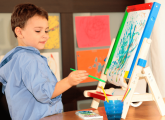Young children are naturally curious about the world around them. But how do we nurture that curiosity into kindness towards the natural world? Helen McGonigal investigates…
Children will protect the things that they love. If they experience the outdoors as much as possible, and in all weathers too, they’ll want to look after it without very much encouragement at all.
Bringing the outdoors in is also important. You could have a nature table or shelf that the children can contribute to with treasures found during weekend and after-school adventures.
This provides a neat link to home and a point of discussion for group time, too.
Children in early years are exploring cause and effect, and the consequences of their actions.
So, this is a perfect time to introduce the positive and negative impacts they can have on the environment with some intriguing questions and thought-provoking explorations.
What happens to litter if we drop it? What happens to our rubbish when we throw it ‘away’ or recycle it?
What happens to the waste we put in a compost bin? What happens to seeds when we sow them?
If you can encourage wildlife into your early years learning landscape, there will be plenty for children to explore and look after.
Better still, you can involve the children themselves in creating those habitats. This will make them feel proactive and encourage their nurturing instincts.
Planting bulbs and sowing wildflower patches will entice pollinators and birds to your setting. Installing bird feeders, bird and bat boxes or hedgehog houses, as well as building bug hotels are all fantastic activities to welcome wildlife.
Understanding where our food comes from, and the work involved in producing it, is really important for children.
As they grow older, this understanding will help them make informed choices about what they eat and where it comes from, taking into account animal welfare, food miles and growing conditions.
Children are endlessly fascinated by growing their own food and it doesn’t have to take up lots of room.
It’s really easy to grow cress, salad, herbs, dwarf beans, peas and tomatoes in pots on sunny windowsills, whilst strawberries and tumbling cherry tomatoes can even be grown in hanging baskets.
If you’re lucky enough to have a bit more space, you can expand the range to include radishes, beetroots, potatoes and squashes, all of which are easy to grow outside.
How much waste we produce and what we do with it is a huge aspect of caring for the environment.
Collecting waste really helps children (and adults!) to understand how much we create before working out how best to dispose of it.
Children could start by carrying out a bin audit using a simple tally chart (great for maths skills) to work out the worst waste culprits. Include paper, snack time food waste, glue sticks or felt pens.
They can then work together to think of ways to reduce the amount of waste in the first place and recycle, reuse or rot the rest.
There are some excellent fiction and non-fiction books available that address environmental issues.
Sharing books, as we know, is a great way to increase awareness, instigate group discussion, develop vocabulary and encourage empathy.
Keeping a selection of books in your outdoor area is really important too.
When Earth Day comes around on 22nd April, why not make it a whole Earth Week in your early years setting?
Dress in ‘green’ outfits, share stories about nature and the environment, repurpose waste into useful items, carry out a waste audit or collect your waste for the week to see how much it amounts to.
Environmental issues don’t have to be saved for special days; they can be introduced into lots of conversations.
When children find a bug at school, you can take photos, draw pictures, describe it, talk about being gentle, discuss where it might be happiest living and find it a home.
When a toy or piece of equipment is damaged or broken, this is a perfect opportunity to talk about looking after our possessions, repairing them and where they go when we throw them ‘away’ at the end of their life.
Discussions like these get little minds working, encourage empathy for our natural world and are great for developing language and communication skills, too.
Helen McGonigal is a teaching assistant in early years, an eco-blogger and mum of three. You can find more inspiration from Helen at spotofearth.com
Recommended reading list
The Trouble With Dragons by Debi Gliori
Tidy by Emily Gravett
My Green Day by Melanie Walsh
Ten Things I Can Do to Help My World by Melanie Walsh
Dear Greenpeace by Simon James
The Journey Home by Frann Preston-Gannon

P4C – 3 activities to get preschoolers thinking
Editors picks

Montessori approach – How to encourage independence
Editors picks
